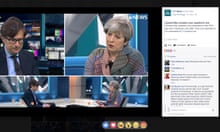A senior Facebook boss has accused parents in the UK of helping their children to open an account before they are 13, flouting the minimum age restriction for signing up to the social media giant.
Facebook’s policy director, Simon Milner, was giving evidence on Tuesday before a parliamentary committee looking into issues surrounding children’s use of the internet.
When the committee raised concerns about children as young as eight having Facebook profiles, Milner said it was difficult to police when parents allowed their children – and even actively helped them – to open an account.

Milner, who is policy director for the UK and Ireland, as well as the Middle East, Africa and Turkey, said research suggested there were “not many” eight-year-olds on Facebook; there were, however, a lot of 10- and 12-year-olds lying about their age.
He said the company worked hard to ensure that users were aware of Facebook’s age restriction and to enforce it. However, there was a fundamental issue in the UK, he said, where many parents chose for whatever reason to allow their underage children to sign up and open a profile under a false age.
“Often they’ve helped their children to get on Facebook,” said Milner. “It’s very hard for us to know the person is not the age that they say they are.
“It’s a really fundamental problem. We’ve not found a ready-made solution … when millions of parents are making that decision, how can we enforce our policy?”
Milner, who was one of a number of witnesses appearing before the House of Lords communications committee, also challenged parents when asked about the amount of time children spend on screens and the compulsive nature of the internet. “It’s important for parents to set a good example,” he said.
If there is a family rule of no phones at the dinner table, then that should apply to parents as well as children, he told the committee, adding that Facebook was not trying to preach to families. “Who are we to tell parents how to bring up their children?”
Milner told the committee that nothing was more important to Facebook than the safety of its users, particularly those under 18. He said the company employed hundreds of safety experts and worked in partnership with other safety organisations.
Asked about policy when a young person on Facebook appeared to be at risk of self-harm or suicide, Milner said if particularly concerning cases were flagged up to the network it would intervene and even go as far as to alert the local police.
Milner was also asked about the issue of “fake news” and the suggestion that it could have influenced the outcome of the US election.
He said that “much less than 1%” of Facebook’s entire content was fake or inauthentic, adding: “We want to try to find ways to diminish the extent of that content on Facebook.”
Also appearing before the committee was Katie O’Donovan, Google’s public policy and government relations manager, who was asked about the “right to be forgotten” ruling by the European court of justice in 2014, which allows EU residents to request the removal of search results that they feel link to outdated or irrelevant information about themselves.
O’Donovan said there were 100,000 requests in the UK last year of which 40% were granted. Whether the ruling – or something similar – would still apply once the UK leaves the EU remains to be seen, the committee was told.










Comments (…)
Sign in or create your Guardian account to join the discussion